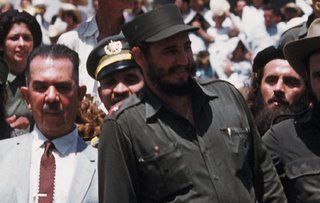Saturday, August 26, 2006
Fidel Castro is revered by many

Here is a Pan-Africanist perspective on Cuban Leader Fidel Castro by Dr. Malik Sekou, a colleague and now Chair of the Humanities/Social Sciences Division of the University of the Virgin Islands, where I had the pleasure of teaching for two years. The article appeared in the August 23, 2006 edition of the Virgin Islands' Daily News.
We must be careful about our sources of information especially when it comes to Cuban politics. If you read the "mainstream" U.S. media you will only find Castrophobia, anti-Communist hysteria, and the same old drivel about Cuba's human rights violations.
Speaking from the Pan-Africanist side of the political spectrum in the Virgin Islands, Cuban President Fidel Castro's recent illness is a reminder of the mortality of revolutionaries but immortality of revolutionary ideas. We on the left wish Fidel a speedy recovery, but we are well aware that as he passed the 80-year milestone on Aug. 13, his physical presence has reached the golden stage.
I was impressed to read that priests from the African-Cuban religion invoked African gods to aid the recovery of Fidel. According to Granma, the Cuban newspaper, a priest, Victor Betancourt, insisted that: "We have to fight for health. We want to do a tambor (ritual) on the beach to Olokún (the divinity of the depths) with an animal sacrifice." The article went on to state that the Yoruba Association of Cuba prayed to the pantheon of orishas or divinities for the leader's health. "As religious believers, our position is to follow the plans of the gods, which are to understand and support the decisions taken by our maximum leader." Ase.
I know that well-wishers from every faith tradition - Christian, Muslim, Hindu, Buddhist, Ifa, and other African spiritual systems -sent warm birthday greetings and get-well messages. Fidel is highly respected and held in high esteem throughout the developing world, especially among African people.
Among Pan-Africanists, Fidel is within the same rank of Kwame Nkrumah, Ahmed Sekou Toure, Modibo Keita, Gamal Abdel Nasser, Amilcar Cabral, Patrice Lumumba and Mangaliso Robert Sobukwe. By the way, it is reported that he has a "lick of the tar brush," African blood runs through his veins just as most Cubans -Â even the "white" ones. Even more, his politics is the combination of many influences but two stand out - Jose Marti and Antonio Maceo. Maceo, the indomitable African-Cuban general of Cuba's two independence wars, is an ideological ancestor of Fidel.
But why do Pan-Africanists, black conscious groups, and African nationalists revere Fidel? Why do we tolerate domestic U.S. repression in order to support the Cuban people? Even more, some may ask why should Virgin Islanders embrace Cuba when its normalization of relations with the U.S. government may negatively impact our tourism?
Cuba is a part of the larger African world community and it is very much a Latin-African Caribbean society. During the early decades of the 20th century, hundreds of Virgin Islanders immigrated to Cuba in search of gainful employment. In fact, many Caribbean islanders have had close family ties to Cuban society for over a century. But more importantly, Cuba's Caribbean and African foreign policies have been honorable.
For four decades, Cuba supported just about every anti-colonial movement in Africa. In fact, guerrilla movements ranging from the MPLA, Angola, PAIGC, Guinea-Bissau and SWAPO, Namibia were aided in their struggle against imperialism, colonialism and in Southern Africa, white supremacy. The Cuban involvement in the decisive battle of Cuito Cuanavale in Angola was responsible for the retreat of South African occupation of Namibia, intervention in Angola, and eventual dismantling of apartheid in South Africa/Azania.
Closer to home Cuba has given thousands of scholarships to students within the Caribbean Basin. In fact, a standing offer to educate U.S. students in Cuba's medical schools still exists. Yes, Virgin Islanders can go to Cuba for medical school for free!
Cuba is not a threat to the United States or its territories. The Cuban Communist Party has already made a leadership succession and it includes hundreds of thousands of fervently nationalistic Cubans whose ancestry, color and faith reflect the masses. Even when Fidel leaves, his ideas will last forever within the Cuban Communist Party and Cuban People.
Dr. Malik Sekou is an associate professor of political science-history and Chairman of the Humanities-Social Sciences Division at the University of the Virgin Islands. He lives on St. Thomas.
The photo of Fidel Castro standing next to Lázaro Cárdenas (in coat and tie) was taken by my father, Dr. Thomas G. Mathews while the Cuban leader was reviewing a parade as part of the country's first July 26 celebrations following the overthrow of the Batista regime.
Labels: Caribbean, Latin America, Newspaper columns


